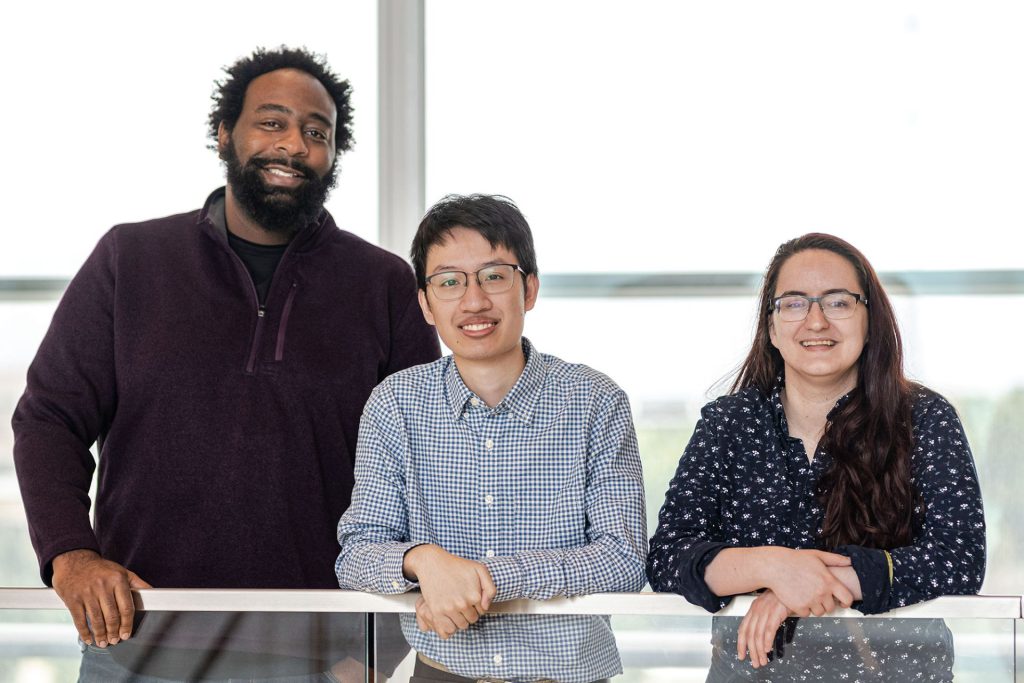About Us
The Center for Advanced Pain Studies (CAPS) is composed of six founding UT Dallas faculty, affiliate faculty at UT Southwestern (UTSW), twelve postdoctoral fellows/research associates, and graduate students across multiple academic disciplines studying different facets of chronic pain and migraine.
Chronic pain is a significant problem of world-wide importance. The most common cause of long-term disability in the world, the annual cost of chronic pain in the U.S. is as high as $635 billion a year; more than cancer, heart disease, and diabetes care combined. CAPS is aggressively pursuing lines of research aimed at alleviating suffering from pain and improving the lives of people with chronic pain and/or migraine.
The research mission of the Center for Advanced Pain Studies (CAPS) is to elucidate fundamental mechanisms underlying chronic pain and migraine, as well as to discover novel therapeutics for the treatment of chronic pain through academic, public, and private partnerships. The center will catalyze existing and future research activities and become an internationally recognized research leader in basic pain and migraine mechanisms and therapeutics discovery. It will also be a launching pad for entrepreneurship and innovation, helping Dallas to become the next hotbed of therapeutic discovery for our two primary focus areas: chronic pain and migraine.
The center will play a pivotal role in drawing together investigators across disciplines ranging from neuroscience, molecular biology, bioengineering, chemistry, and neuroengineering to advance discoveries, translate findings, and foster the next generation of multidisciplinary scientists pursuing pain research. Our scientists are pursuing treatments for some of the most costly and disabling brain diseases: chronic pain, neuropathic pain, and migraine headache.

The center aims to become an internationally recognized leader in the biomolecular mechanisms of chronic pain and migraine, demonstration of novel approaches for therapeutic candidate screening and development, and the exploration of new technologies for chronic pain and migraine treatment such as, bioelectronic medicines and personalized (genetically-targeted) medicine. In line with President Benson’s call for leadership in the big data revolution, the center is focused on the emerging field of comparative transcriptomics with an emphasis on generating and analyzing data from chronic pain cohorts. This positions us at the forefront of the most rapidly growing area of neuroscience. We have already created a public resource that is widely used by the pain field in this area.
Collectively, these activities within the center enhance visibility of pain and migraine research for prospective students and raise national recognition of pain-related research and associated academic programs for the university.

The center shares the expertise and technology necessary to foster new research endeavors in pain studies. The capabilities in pain research range from animal behavioral paradigms, genomic and molecular biological methodologies, high-content electrophysiological and imaging techniques, cell culture, and medicinal chemistry methods. Conceived at a meeting hosted by UTD, the center is the focal point for coordination with the Texas Pain Research Consortium, which has developed into a thriving organization that brings together pain researchers across the UT System and the State. The CAPS cultivates UT Dallas investigators who are new to pain research, but also bring novel ideas, reagents, and/or technology by providing core expertise and experimentation necessary to generate preliminary data for future federal grant proposals. Our vision is that by centralizing the resources within the CAPS, researchers will be able to optimize infrastructure support while interacting collaboratively with each other and the new faculty hired as a part of the center. Under President Benson’s leadership, as we develop our first strategic plan as a Tier 1 University, we envision the CAPS being a major player in further developing UTD’s federal funding portfolio. In this regard, it is notable that CAPS is broadly aligned with the new Federal Pain Research Strategy recently released by NIH.
The center has a significant education mission. It will host regular invited speakers and support the summer research experience of exceptional undergraduates seeking exposure to pain research outside of UT Dallas. In addition, the center will convene regular outreach activities to inform the public of issues and emergent solutions for chronic pain. While these educational activities cultivate the scholarly community of UT Dallas around this important research area, these activities also promote visibility for the University, faculty, and most importantly, our exceptional students.
In accordance with President Benson’s call for entrepreneurship and innovation at UTD, a goal of the center will be to generate new intellectual property and work actively to move molecules and other new therapeutics toward clinical development. The challenge of treating chronic pain has never been more important for society, yet Big Pharma has mostly vacated the analgesic development space. We will strive to meet this expansive need by translating mechanisms into therapeutics. Many of the founders of the CAPS have strong experience in this area and will mentor new faculty in how to drive their discoveries toward commercialization.
